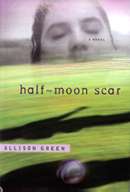|
|
||||||||
| Excerpts: | ||||||||
|

Gay/Lesbian/Feminist Bookstores Around the Country
The Mostly Unfabulous Homepage of Ethan Green
![]()

 Excerpt One: "Victoria and Main"
Excerpt One: "Victoria and Main"
By Allison Green
From Half-Moon Scar
I sat in my mother’s car outside Gina’s house, the map of Willow Bay in my lap, finger on the corner of Victoria and Main. My mother’s car smelled like hand lotion and those thick tissues that come in pink boxes. Rain hit the windshield. Across the street was a Catholic church and a Catholic church school, a green lawn, sprinklers turning in the rain. The rain on the windshield blurred the school and the green lawn. When my Lutheran mother married my Catholic father, the room in the basement of the Lutheran church where they held the reception could have been divided by an electric fence, my mother said. No one crossed – no one wanted to get zapped. After they got married my dad converted and I never went into a Catholic church.
My finger pressed the map. Victoria and Main. This had to be the house: beige with orange trim, two stories, clapboard siding. Paint had fallen off in chunks, and cracks branched up from the foundation. Gina’s house. When I had spun that glove and stuck that tack into its skin, the tack landed here, on this house.
I put the map on the passenger seat, brushed the side of the door for the handle, found it, stepped out. Rain hit my glasses. I watched my feet walk up the gravel drive. Black sneakers. Army surplus jacket. Chocolate-covered apricots in a silver box. All to say: Dyke from the City. The One Who Got Out.
But my heart had started up. Flutter, flap. A bird stuck in a chimney.
The steps up to the screened-in front porch had crumbled. Faint television voices came through the closed window above me. I rang the doorbell, a rectangle glowing orange.
A voice said, "Amy?"
Gina came around the side of the house. Gina Winiecki. She had that same hair brushed back, not as blond as it had been. Long, yellow-haired legs ended in running shoes without socks. Her hands turned open toward me, long-fingered hands, and we hugged, my body touched by the impression of small breasts, narrow shoulders and waist, and then the air and rain were between us, and a faint smell of sweat. "Gina," I said.
"Amy." She smiled, tongue showing, crooked eyeteeth showing.
I followed her around the house to the back door. Apple trees and a picket fence and a beige garage screened the yard from the traffic behind it on Main. The yard was a dandelion yard, gold dandelions three feet high. Rain dripped from an apple tree onto a picnic table.
On the landing I hung my jacket and followed Gina up three stairs to the kitchen. "Chocolate-covered apricots," I said, holding out the box. "I hope you’re not allergic. My girlfriend is allergic to the sulfur they use on apricots." I watched her eyes when I said "my girlfriend" and they looked right at mine. She bit the cellophane on the box to get it started and her long fingers peeled the cellophane off. She opened the lid: fat lumps of chocolate. She smiled, lips closed, and replaced the lid without eating any. "Thank you. Cup of tea?"
I sat in a folding chair at the table. The wallpaper – above the counter, along the table – had red roosters and brown teapots. Around the stove the roosters and teapots were polka-dotted with red splatters. Gina filled a teakettle with water and turned on the burner. "It’s been a long time," I said.
"Thirteen years." Gina reached into the cupboard and brought out blue mugs. "Unlucky thirteen."
"Thirteen?" I could feel the imprint of her hand on my waist in the darkness of the amusement park ride.
"Thirteen years ago," Gina said, "I went through your line at the Red Owl."
I felt again the rubber mat under my feet, my fingers on the cash register keys.
"Remember? Just before you left." She was taking tea boxes out of the cupboard. "I remember because you told me you were going to Madison and I was short – I think it was a carton of cigarettes – and you said you’d cover me."
Yes. Gina buying a carton of cigarettes in my line at the Red Owl. I remembered looking at her hands as they picked up the carton.
Gina said, "So what’s happened in thirteen years?" As she made tea, I told her about college and graduate school and tenure. I didn’t tell her about the woman who slept with her ex again – "Just once. Why are you so uptight?" The one who kicked me out of my own car and made me walk the two miles back home. The one who pushed me, not hard really, just enough for me to fall and sprain my wrist. I didn’t tell her about Robin, either, who, when I was sick, made tea from her own mint, whose exes lived in other states, and who, just weeks before, had said it was time we combined our households, and she would sell her house and garden if I wanted to find a new house together.
When it was Gina’s turn, she said nothing about lovers either. She told me she tended bar at night, coached girls’ soccer and basketball, and worked in the summers as a day-camp counselor. "They don’t pay squat," she said, "but I like working outside." Then silence.
What else to say? I said, "Nice house. Do you own it?"
"No. Cheap rent though."
"That’s good." By then she’d poured three cups of tea, and I thought: Roommate? Lover? She smiled, tongue showing, crooked eyeteeth showing. "Let’s go to the front room."
She shouldered through a swinging door to the front of the house. I followed with my cup through a dim living room, fireplace on the right, screened front porch ahead. On the left were French doors. She nodded at them, her hands full. I turned the glass handle. The door opened to the smell of unwashed sheets, to white walls, to television voices. And under an orange afghan, to Gavin.
"Amelia!"
My knees loosened and the muscles in my calves had to straighten me up. Gavin. The last words I’d said to him: "Freak. Fag." The last time I’d seen him: pulling up his pants, white face in the darkness.
His eyes now were big, the big of eyes left behind glasses, but he didn’t wear glasses. His cheeks and the cleft in his chin had gone shallow. The word for his illness ballooned in the back of my throat.
He elbowed the pillows to push himself upright. "Amelia." Gavin’s voice. The sound came to me more like a smell than a sound, calling up memories. His younger face swam beneath the surface of this grown-up stranger’s face. But the half-moon scar was there on his nose, and when I saw it I knew he was really Gavin.
Copyright © 2000 Allison Green.
 Back
to the Stonewall Inn
Back
to the Stonewall Inn
